#chinese coronavirus
Text
Hi tumblr.. Please pay some attention to the incident happened in my country China, city Urumqi, Xinjiang. The city was blocked for more than 100 days due to the epidemic, which seriously affected people's life. On November 24, a fire broke out in a community in Urumqi, but the firefighters were unable to put out the fire in time because of the blockade. In the end ten People died, including a 3-year-old child. Last night (11.25) the people of Urumqi finally took to the streets out of despair and anger. They went to the city hall to march and protest, and confronted the police. This was extremely brave but also very dangerous.
Chinese Internet is extremely closed, and all content posted online is subject to examination and control. We are trying our best to convey this message to more people.
I'm very sorry if I disturbed you all, but if possible, please give the people of my country a little international attention and support, thank you😢If you need more content please check this twitter account:
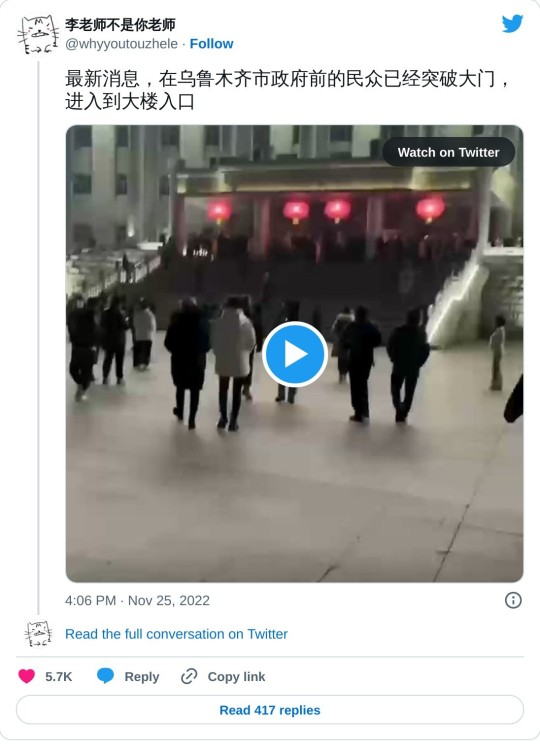
I am really desperate and terribly worried for people of Urumqi right now and I hope this incident could reach to more people around the world. Thank you.
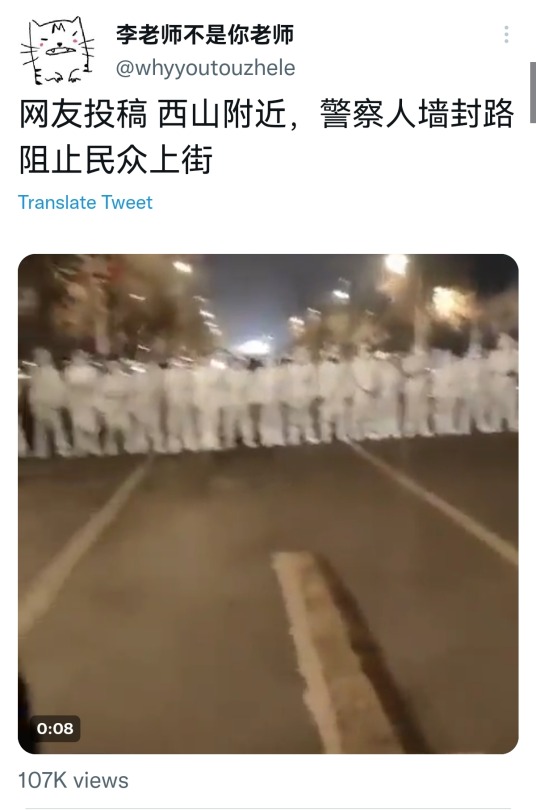
#Xinjiang#Urumqi#China#blockade#中国#新疆#乌鲁木齐#covid 19#coronavirus#pandemic#protest#march#international news#chinese news
1K notes
·
View notes
Text
i thought the media literacy problem was an online only thing but i keep replaying a conversation i recently had where someone asked me why i didnt like atla (after id said i didnt want to talk about it) and i said the very standard "two white men wrote a fantasy story where they made up fake asian countries and words and names and apparently made a parallel to an irl slaughter of a bunch of buddhist monks" and they spent altogether too long explaining to me the plot of atla and its morals then sat there staring at me as if they'd answered a question i had or something and somehow the two white men writing about fake asian countries had been sainted
#this was an employed adult ive known for a while now#+ a while back i was watching news with someone and the 'expert' being interviewed was using a TON of conspiracy lingo#i pointed it out and the person i was watching with was like 'but theyre being interviewed as an expert' like please. please man#like. idk how 'impartial' an 'expert' is on asian politics whenoperating with the suspicion that coronavirus was a chinese bioweapon in 202#the most recent fh adventuring party had a good quote about how you can be well educated and tutored but you cant teach curiosity
19 notes
·
View notes
Video
youtube
COVID rapidly spreads in China as government eases strict quarantine rules, December 27, 2022
China is grappling with the rapid spread of COVID-19 after the government began rolling back its zero-COVID restrictions earlier this month. Now, cases are spiraling across towns and cities, hospitals are overburdened, medical staff are outnumbered and crematoriums are running out of space. Judy Woodruff reports.
PBS NewsHour
There is no nuance left in politics or public health policy when there is either an absolute and strict inflexibility of zero COVID or wholesale dismantling of safeguards before the healthcare or support systems are prepared for the waves that have been forcibly suppressed. The political insistence on using their own less effective, non-mRNA vaccines based on the original strains rather than Delta or Omicron, coupled with a low vaccination rate of the vulnerable and elderly is not helping easing the transition at all.
The way they’ve been counting mortality from COVID diverged from nearly every other country since early 2020. A death had to be directly attributable to SARS-CoV-2 eliminating cases of many preexisting or undiagnosed conditions, chronic illnesses, and other high risk factors that may have been exacerbated by the virus which became listed as the direct cause or if they simply tested negative in the few days before dying. The policy as of this week will further limit the count only to deaths caused by pneumonia or respiratory failure after contracting COVID, in addition to dropping much of the remaining inbound quarantines and regular case counts becoming even more inconsistent with lived reality.
It appears the PRC was prepared to stay in suspended animation within an onionskin of self-isolation layers indefinitely, maintaining the appearance of control and adherence to policy that was left to different local officials to execute. Downgrading the classification removes the local, emergency-style powers to lockdown and quarantine which were used capriciously. Residential buildings, offices and commercial areas such as malls, and even theme parks could be suddenly cordoned without warning, causing panic due to the stringency of testing and knock-on effects if a positive case was found rather than fear of having contacted or contracted the virus. Becoming listed as a close contact or a complete stranger’s positive result could mean further quarantining and repeated testing, as well any change in one’s COVID passport status severely restricting mobility for work or education, travel, or even basic necessities. The protests spread because “dynamic zero” was anything but dynamic, refusing to change or amend course in preparation for a transition to an endemic or post-epidemic state. People were simply fed up and the building momentum was becoming a potential danger to a regime that had just renewed its own political mandates.
These things aren’t happening in isolation, China is also changing tact on its travel restrictions domestically and internationally. The Special Administrative Regions of Hong Kong and Macau have been trying to reopen ports and travel with the Mainland for years now for travel and economic reasons. Both were forced into accepting one-way policies where it was difficult for their citizens to enter China or even between one another, while rules were softened for travelers and politicians entering from and returning to the Mainland for short trips with the reason that the pandemic was less well-contained than within the Mainland.
As news of the highly visible current outbreak within China is continuing to emerge, the Hong Kong SAR is now proudly announcing agreements have been made with the Mainland to drop their travel restrictions posthaste. It’s being reported that many are travelling specifically for mRNA vaccines which are approved in Macau and Hong Kong.
#China#covid 19#coronavirus#pandemic#public health#politics#Chinese Communist Party#Xi Jinping#pbs newshour#seriously#fundamentally ridiculous#bureaucracy#zero covid policy#vaccination#epidemiology#reuters#financial times#news#current events#health care
43 notes
·
View notes
Text

BREAKING: CHINA'S BALLOON MULTIPLIES AND CARRIED THE WHITE HOUSE AWAY! DISNEY PIXAR HAS DECIDED TO USE IT AS THE BASIS OF THE SEQEUL TO UP. MOVIE COMES OUT IN 2024.
#chinese balloon#anarchotak#ChinaBalloon#ChineseSpy#Balloon#whitehouse#Chinese#Terror#Terrorism#coronavirus#signal boost#china news#funny memes#meme#disney movies#politics#pixar#up pixar
6 notes
·
View notes
Video
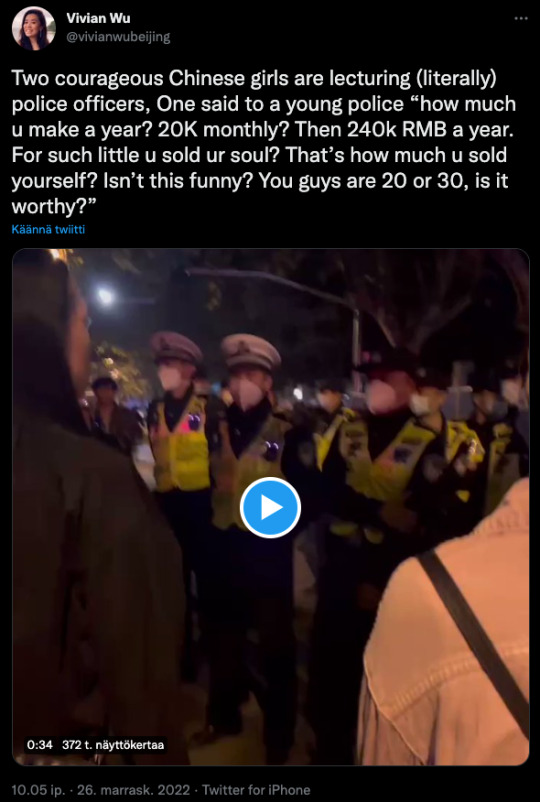
Two courageous Chinese girls are lecturing (literally) police officers, One said to a young police “how much u make a year? 20K monthly? Then 240k RMB a year. For such little u sold ur soul? That’s how much u sold yourself? Isn’t this funny? You guys are 20 or 30, is it worthy?”
https://twitter.com/vivianwubeijing/status/1596595921676079104
#china#chinese#china protests#protest in china#covid#coronavirus#signal boost#protest#video#these girls are brave#please help them by talking about what is happening in china
5 notes
·
View notes
Text
Golden Week: Millions of Chinese tourists are going on holiday again. Many of them are headed for Thailand
CNN
—
Thailand’s golden beaches, shopping districts and ornate temples are filling with tourists once again and Chinese vacationers are getting an especially VIP welcome under a new visa-free scheme.
Vowing to revive the country’s economy, newly appointed Prime Minister Srettha Thavisin announced a visa-free policy for Chinese and Kazakh tourists that would run from September 25 to February…
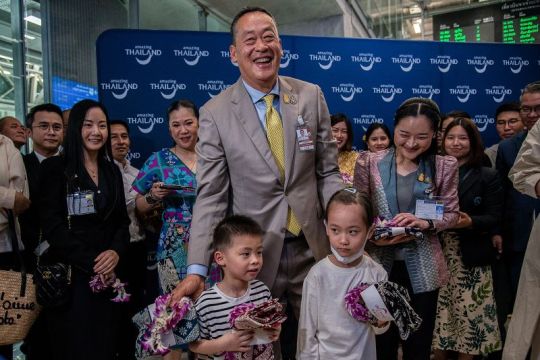
View On WordPress
#&010;&010;new#again#air transportation#airlines#are#asia?#brand safety-nsf health issues#brand safety-nsf sensitive#business#business and industry sectors#china#chinese#continents and regions#coronavirus#coronavirus pandemic#diseases and disorders#domestic alerts#domestic-business#domestic-coronavirus#domestic-health and science#domestic-international news#east asia#economy and economic indicators#economy and trade#epidemics and outbreaks#featured#financial#for#going#golden
0 notes
Text
China says restrictions on its travellers abroad discriminatory: Warns countermeasures
#china covid measures#china coronavirus#restrictions on travellers abroad discriminatory#china#china news#china latest news#china covid surge#china covid outbreak#china passengers guidelines#china pasengers guidelines#China travel restrictions#Restrictions on chinese passengers#China covid cases#China zero covid policy#China covid cases today#World news#Latest world news#china travel restrictions from india
0 notes
Text
BBC says Chinese police assaulted one of its journalists at Shanghai protest
BBC says Chinese police assaulted one of its journalists at Shanghai protest
The BBC said on Sunday that Chinese police assaulted and detained one of its journalists covering a protest in Shanghai, before later releasing him after several hours.
“The BBC is extremely concerned about the treatment of our journalist Ed Lawrence, who was arrested and handcuffed while covering the protests in Shanghai,” a spokesperson for the British public service broadcaster said in a…
View On WordPress
#BBC journalist assaulted#china covid-19 protests#china president Xi Jinping#china protest#china&039;s zero-covid policy#Chinese Communist Party#coronavirus cases in china#covid 19 cases in china#covid-19 lockdown#protests in China#xi jinping
0 notes
Text
Pirate🇨🇳Party
#chinese communist party#ccp#pure madness#halloween#walking dead#china#mental disorder#mental health#pandemic#pandemia#death cult#mafia story#actually psychotic#fearful#lockdown#corruption#coverup#communism#coronavirus#covid19
0 notes
Link
youtube
China: Video shows BBC journalist's arrest during Covid protest, November 28, 2022
Video shared on social media shows the moment BBC journalist Edward Lawrence was arrested by Chinese authorities while covering an anti-lockdown protest in Shanghai. Lawrence was dragged away by police shouting "Call the Consulate, now." Protests over Covid restrictions have spread to several cities across China and were triggered by a deadly fire at a residential high-rise building in the city of Urumqi, in the country's western Xinjiang region. Videos of the incident posted on social media led to accusations that lockdowns were a factor in the blaze that killed 10 people
The Guardian
Further reading:
The Guardian: Clashes in Shanghai as protests over zero-Covid policy grip China, November 28, 2022
The Guardian: BBC says Chinese police assaulted and detained its reporter at Shanghai protest, November 28, 2022
The Guardian: Protests erupt in China over strict zero Covid measures: in pictures, November 28, 2022
“He was held for several hours before being released,” a BBC Press Team statement said of Lawrence’s treatment by Shanghai police on Monday. “During his arrest, he was beaten and kicked by the police. This happened while he was working as an accredited journalist… We have no official explanation or apology from the Chinese authorities, beyond a claim by the offices who later released him that they had arrested him for his own good in case he caught Covid from the crowd.”
The public service broadcaster added that it did not consider the police explanation to be credible.
HKFP: China protests: Shanghai police assaulted and arrested journalist, says BBC, November 28, 2022
#china#coronavirus#xi jinping#protest#Urumqi#Xinjiang#pandemic#zero covid policy#Chinese Communist Party#shanghai#BBC#Edward Lawrence#The Guardian#Reuters#Beijing#Chengdu#Lanzhou#Nanjing#Guangzhou#Hong Kong#Chongqing#Wuhan#politics#freedom of the press#police brutality#Hong Kong Free Press#journalism#violence#authoritarianism
13 notes
·
View notes
Text
[Mandarin->English] @ixroses666 6:11 AM Aug 31, 2022 Tweet - Color Coded Translation (Intermediate)
Link to tweet
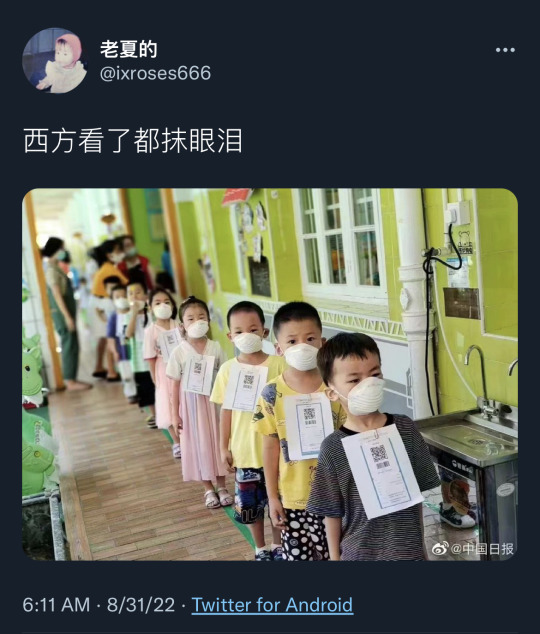
—
西方看了都抹眼泪(淚)
xī fāng kàn le dōu mǒ yǎn lèi
The west watches (us?) wipe tears
—
Please correct me if I made a mistake
#chinese langblr#chinese lesson#learn chinese#mandarin langblr#chinese vocab#color coded translation#chinese to english#current news#current events#coronavirus#corona update#china ccp#photos of china#easy mandarin#mandarin lesson#intermediate mandarin#mandarin vocab#mandarin learning#study mandarin#polyglot thought translation
1 note
·
View note
Video
youtube
Chinese people are angry now! The World Cup showed them masks aren't needed in the world
Chinese people, who have experienced nearly three years of strict control, have become weary of fighting the epidemic. In addition to the massive protests that broke out at Foxconn in Henan on Nov. 23rd, there was a massive revolt against the anti-epidemic policy in Guangzhou's Haizhu district in mid-November.
The World Cup in Qatar, which began in late November, was marked by loud noises and applause on the playfield, in contrast to the "silence" in many mainland Chinese cities. Many Chinese fans watched the games live. They were shocked to see that the players and virtually all spectators wore no masks. This is despite the fact that the CCP media, outside of the live broadcast, tried to blur out the audience as much as possible so that the Chinese audience couldn't see that they weren't wearing masks. But this strange move made the Chinese people speculate even more about the implications.
#fifa 2022#fifa#china#chinese#china protests#protests in china#shanghai#beijing#signal boost#corona virus#coronavirus#video
1 note
·
View note
Text
The economic crisis of Sri Lanka
The economic crisis of Sri Lanka
The crisis of Sri-Lanka is major impact on the Asia’s economy. The economy instability is now been felt across the world. The World is now facing the recession. This is due to the pandemic being a major reason for the cause. This is felt with the reducing the world currency against Dollar. We are here for discussing the Sri- Lanka economic instability.
The Sri-Lankan economy was majorly depends…
View On WordPress
#china#chinese virus#coronavirus#COVID-19#debt-trap#debtfree#Economic crisis#Economy#hanbantota#india#indian economy#Recession#Recession in the World#Russia-Ukraine War#sri lanka
0 notes
Text
Interview with Guobin Yang: the role of the social media amid the Wuhan coronavirus lockdown
New Post has been published on https://china-underground.com/2020/02/05/interview-with-guobin-yang-the-role-of-the-social-media-amid-the-wuhan-coronavirus-lockdown/
Interview with Guobin Yang: the role of the social media amid the Wuhan coronavirus lockdown
Guobin Yang’s study focuses on online activism, social movements, digital culture, cultural sociology, historical sociology, critical theory, global communication, environmental communication, media, and politics in China.
He is the Grace Lee Boggs Professor of Communication and Sociology at the Annenberg School for Communication and Department of Sociology at the University of Pennsylvania, where he is the Associate Dean for Graduate Studies at the Annenberg School for Communication, Director of the Center on Digital Culture and Society, and Deputy Director of the Center for the Study of Contemporary China and the author of the award-winning The Power of the Internet in China: Citizen Activism Online (2009) and The Red Guard Generation and Political Activism in China (2016).
What is the mission of the Center on Digital Culture and Society?
The Center on Digital Culture and Society (CDCS) at the University of Pennsylvania’s Annenberg School for Communication supports critical, interdisciplinary scholarship and dialogue on digital culture, technology, and society. CDCS aims to create collaborative spaces for discussion and debate among academics, citizens, and activists; develop critical approaches to the study of digital culture and technology; help train new generations of digital researchers at the University of Pennsylvania and beyond; build global networks of researchers; advocate for socially just design, production, and use of digital technologies; and explore and foster new visions of digital futures through scholarship and public communication.
Sanitation workers still working on the streets of Wuhan (Image courtesy of Guo Jing)
What is the role of social media in the Wuhan health crisis?
Social media have different roles at different periods of the crisis. In the early period – December 2019, several people posted information about the occurrence of a SARS-like pneumonia in their WeChat groups to warn friends about health risks. These people were soon reprimanded by the police for spreading rumors. News of these people being disciplined “for spreading rumors” was broadcast on TV and on social media, in effect silencing other potential voices. The initial lack of public information may have contributed to the spread of the disease. Hence the abrupt lockdown of the city of Wuhan on January 23. After Wuhan was shut down, social media become a main channel for the public to obtain and share information about the spread of the illness. People also use social media to raise donations for residents in Wuhan and to organize volunteer support. Some residents in Wuhan use social media to post their diaries about lives in Wuhan, which helps other people to understand life on the ground.
In Chinese traditional cultural repertoires, there is a type of individual who is daring enough to speak truth to power even at the risk of their own lives.
Wuhan (Image courtesy of Guo Jing)
Who are the digital radicals?
Everyone can be a digital radical. We at the Center on Digital Culture and Society want to explore new forms of human relationships with digital technologies. Last summer, we issued a call for submissions of stories of digital radicals from around the world. We think of a digital radical as a person with a radical relationship to digital technologies, but we leave it to our readers to decide whether they have a radical relationship with their technology and what is radical about it.
In the middle of the coronavirus crisis, various forms of digital radicalism have appeared. I discussed two types in my story here, and called them “digital whistleblowers” and “social media diarists” respectively. Obviously, there are other types as well, such as people who use social media to mobilize support for residents in Wuhan.
People lined up in the supermarket (Image: Guo Jing)
What role can whistleblowers play in Chinese society?
In Chinese traditional cultural repertoires, there is a type of individual who is daring enough to speak truth to power even at the risk of their own lives. In the past, the Confucian literati may play such a role. In modern history, students and intellectuals often played such a role. These individuals are considered as the conscience of the people. In some sense, whistleblowers are somewhat like such daring individuals, although in the recent case of the coronavirus crisis, the eight individuals who are called “whistleblowers” by the media do not necessarily consider themselves as such. At least two of those who have talked to the media about their experiences said explicitly that they posted information about the illness merely to warn their families and friends to take precautions.
Are there forms of boycotting social media in China?
Not that I know of.
What are the stories told by social media diarists in Wuhan?
A great variety. Most of them are matter-of-fact reports of their daily lives after the city was shut down, such as what they ate for their daily meals, where they shopped, what they saw in the streets. They are very personal stories. Some of the diaries contain ruminations about these situations and about the various problems that are exposed by the virus crisis, such as internet censorship, the shortage of medical supplies, the ineptness of the bureaucracies. They usually come with many photographs, and some post videos as well. These are valuable records of an extraordinary period of urban history.
What does the clumsy management of the crisis by the Wuhan authorities show?
It shows how unprepared China’s bureaucracies and social service institutions are for such crisis situations. It also shows that freedom and transparency of information are critical for managing social crisis, but are lacking, to say the least.
(Image: Guo Jing)
Across the west, since the news of the coronavirus spread, countless acts of racism have occurred against Asian citizens. At the time of Sars, these discriminatory acts had not occurred with so much force. What has changed?
Was there less discrimination during SARS? I don’t know. But it’s abominating to see all forms of racism against Chinese-looking people around the world after the Wuhan coronavirus outbreak. What has caused this racism? I suspect it has always been there, and the virus just gives it a convenient new channel. But it’s also heart-warming to see as many gestures of hospitality, such as the # #abbracciauncinese hashtag initiative in Italy. I hope someday we do not have to offer such special gestures to anyone in the world – that will be the moment of true equality.
How do social media and new technologies shape modern Chinese society?
By bringing out both its best and its worst.
Featured image courtesy of Guobin Yang
Other images: Guo Jing
#ChineseSocialNetwork, #Coronavirus, #DigitalCulture, #SocialActivism, #Wuhan
0 notes
Photo
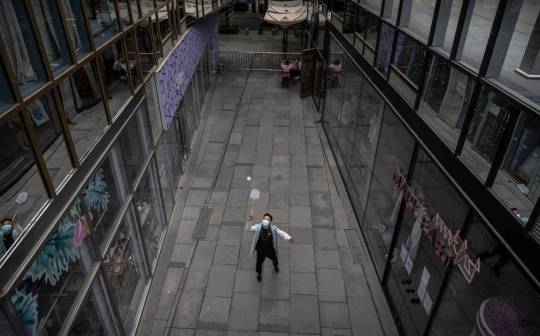
Beijing, China: A worker plays badminton with a colleague next to closed shops in the usually bustling Taikoo Li mall. Many places remain closed as authorities try to contain a rise in Covid-19 cases.
Photograph: Kevin Frayer/Getty Images
1 note
·
View note